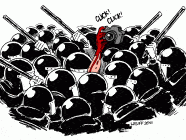The public still believes that one of the most important roles the media can play is to act as a watchdog holding key institutions and individuals to account, according to a new cross-national study.
The watchdog journalism model is one of the most popular among journalists worldwide and reflects the long‐established liberal conception of the news media as the fourth estate. But critics have argued recently that journalism has become indiscriminately critical and corrosively cynical of officials and candidates. They complain that this can lead to overemphasized sensational reporting that is argued to increase apathy and cynicism about politics and to decrease news credibility.
A study by Nael Jebril at the Reuters Institute for the Study of Journalism argues in his paper: “Is Watchdog Journalism Satisfactory Journalism? A Cross-national Study of Public Satisfaction with Political Coverage” that the public want watchdog journalism: they are more satisfied with news outlets that they believe fulfil this function.
The study surveyed public attitudes to the media in three European countries: Spain, Great Britain and Denmark. The researchers used Daniel C. Hallin and Paolo Mancini’s classic work “Comparing Media Systems: Models of Media and Politics,” to select the countries. Britain represents the Liberal Model known for its early development of press freedom and the predominance of commercial and professional journalism. Denmark represents the Democratic Corporatist Model, which features a strong mass-circulation commercial press and media that are tied to political and civil groups, the presence of both political parallelism and professionalization, and the traditions of both press freedom and active state intervention. Spain represents the Polarized Pluralist Model, which is characterized by a high degree of political parallelism and a weak development of the commercial press. The country also features a relatively weak public service regulation compared to Britain and Denmark.
Taking advantage of the cross-national design, the paper examines whether differences in news satisfaction can be explained by the perceived presence (or absence) of watchdog journalism.
A two-wave panel survey with a representative sample of the Danish, British and Spanish populations was conducted through managed online access panels. The general population targeted was from 18-65 years old and the questionnaire length was about 15 minutes for each wave.
The response rates in Denmark were 75 percent in wave I and 68.2 percent in wave II; in Britain 63.3 percent in wave I and 74.4 percent in wave II; and in Spain 74.7 percent in wave I and 74.6 percent in wave II. A net sample of 1,539 respondents in Denmark, 1,571 respondents in Britain, and 1,642 respondents in Spain participated in both waves.
In this study news satisfaction is conceived as a response following media exposure. News is assumed to be a product vested with public interest rather than a commodity product and an evaluation of media use is assumed to precede the feeling of satisfaction.
The study points out that the watchdog model has important implications for the relationship between the media and the state. While authoritarian theories hold that journalism should always be subordinate to the interests of the state in maintaining social order or achieving political goals, the liberal press theory expects the press to provide a marketplace of ideas and sees the government as the primary (if not only) threat to press freedom. In addition, the watchdog model dominates the occupational ideology of journalists.
The ideal of objectivity is central to journalists’ professional self-perception. Although no one can be value neutral, journalists and researchers adopt concepts such as fairness, professional distance, or impartiality. The watchdog journalist is, above all, a broker of relevant information with a distinctive, objective style of reporting based on facts. The watchdog role is also meant to distinguish between factual coverage and commentary.
To measure perceived watchdog reporting, respondents were asked to rate each news outlet (per country) according to the following watchdog criteria: objective, informative, and critical-of-government news reporting. The question was: “Media are different in the way they operate and cover issues. Using the scale provided, please rate each of the following media.”
Danes and Brits perceive the journalistic style of their media to be significantly more in line with the watchdog ideal than the general population in Spain.
The Spanish audience is also the least satisfied with media coverage. To measure audience satisfaction with political coverage respondents were asked to answer the following question: “How satisfied or not are you with the way in which national politics is covered by the media in general?” The results show that Denmark comprises the largest proportion of highly satisfied individuals (55 percent), followed by Britain (40 percent ), then Spain (33 percent). Denmark also has the smallest proportion of dissatisfied respondents (20 percent), followed by Britain (26 percent), then Spain (34 percent). On average, respondents in Denmark and Britain showed the highest levels of overall satisfaction with political coverage, and those in Spain the lowest.
Citizens in Denmark and Britain perceive their media to act more as watchdogs than citizens in Spain do. Danish citizens are by far the most satisfied with their media’s coverage of politics, followed by Britain. In Spain, the satisfaction is the lowest with more than one-third being outright dissatisfied. The analysis shows that perceived watchdog reporting increases satisfaction with political coverage; the more respondents perceived news media to perform according to the watchdog journalistic ideal, the more they are satisfied with the overall coverage of national politics.
The analysis further provides that respondents’ perceptions of watchdog coverage mediate the effects of news exposure on satisfaction with political coverage.
Journalism researchers generally agree about the inadequacy of the watchdog model as an empirical journalistic standard. Objectivity, informational quality, and critical stances to power holders do not always go together. That said, Jebril argues that the evidence provided in this paper suggests a rather favorable public perception of that model. The general public appreciate the media acting as watchdog, regardless of critics’ fears that it may eventually lead to cynicism and disaffection with politics.
Critics have claimed that there is potential conflict between the ideal of objectivity and the need for the journalist to function as an active watchdog in the public interest. This study has shown however that the public believe journalists can be objective while being critical of government, and are happier with media that combines both.
Photo by: flickr4jazz / Flickr CC
Tags: Denmark, Great Britain Politics, Media Standards, Politics, Spain, Watchdogs














































